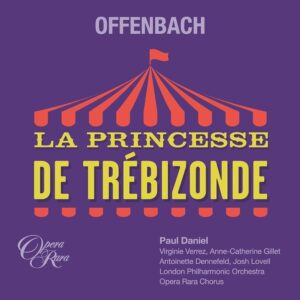
CD Review: Opera Rara’s ‘La Princesse de Trébizonde’
By Bob DieschburgThe production history of Jacques Offenbach’s “La Princesse de Trébizonde” is convoluted to say the least. It premiered twice, once in Baden-Baden and once at the Bouffes-Parisiens in 1869.
In between both versions, it was reworked extensively; pastiches from the unpublished “La Baguette” were removed and Offenbach wrote a whole new act in a bid to align the narrative of his buffo acrobats and circus performers with the highly successful “Les Saltimbanques” by Charles Varin and Théophile Dumersan.
Yet it does not end there; some 150 years later fragments with numbers deleted from the original score were retrieved in a file held by a surviving branch of the Offenbach family and published, for the very first time, as an appendix to Opera Rara’s newest release.
“La Princesse de Trébizonde” is not an archeological rescue strictly speaking; it occasionally tours the smaller stages in the UK and mainland Europe but has lacked a major discographic entry so far.
The British label fills this gap by providing a superlative rendition entrusted to the inspired hands of conductor Paul Daniel and the London Philharmonic Orchestra. Together they set the bar for any successive attempts at this Offenbach rarity which, one might hope, will make a case for its frolic melodies, witful characterizations, and fantastical plot.
A Princess Made of Wax
The story revolves around a wax figure – the Princesse de Trébizonde – with whom the young Prince Raphael falls madly in love. Little does he know it is actually Zanetta from Cabriolo’s traveling troupe of performers who has taken her place.
To satisfy his feelings, he convinces his father to buy the whole collection of waxworks from Cabriolo who is not only made its curator; he is also bestowed on the resounding title of Baron Cascatella!
Add to this a fateful lottery ticket, the impetuous but overall benign temper of Raphael’s father Casimir, and a happy end for the main couple and two subsidiary sets of lovers to condense the text of librettists Charles Nuitter and Étienne Tréfeu to its comedic essence.
The music is accordingly varied, lighthearted but no less sophisticated. The “Romance des Tourterelles,” for instance, mimics the song of the turtledove; at the end of Act one, in “Adieu, Baraque Héréditaire” Offenbach quotes Rossini and, to give another measure of the score’s variety, the “Ariette du Mal de Dents” is a buffo gem made even more efficient by the fact that the part of Prince Raphael is, in fact, a trouser role.
Singing Acrobats
Luckily, Opera Rara and conductor Paul Daniel have assembled a cast that is more than apt to do justice to the musical intricacies of Offenbach’s “La Princesse de Trébizonde.” It is an undeniable advantage that they are French-speaking, born or raised in France, Belgium, Canada, and Guyana; their feel for the language makes the recitatives a sheer delight.
Take tenor Josh Lovell’s beautifully fleshed-out characterization of Prince Casimir, with a keen sense for dramatic timing and comic intuition. The voice is infinitely suggestive and malleable, as Lovell impersonates the aging and no less overbearing Casimir who, in the end, grants his son’s every wish.
Much the same holds true for tenor Loïc Félix who sings the parts of both the lottery director and Prince Raphael’s tutor Sparadrap.
With the French Christophe Mortagne the label has at its disposal an ideal Tremolini; the role does not require vocal stamina as much as charm and plenty of jauntiness which he impressively demonstrates in the fast-paced introduction of “Messieurs, Prêtez-moi vos Oreilles.” Mortagne, after all, has under his belt a first-rate track record of so-called tenorino roles and has performed at the Met – in “Les Contes d’Hoffmann” – as recently as 2017.
Finally, Christophe Gay lends his slender and honeyed baritone to Cabriolo, the leader of the traveling circus and owner of the waxen Princess. Again, the part is less demanding vocally than from a purely dramatic point of view; Cabriolo mainly acts in ensemble scenes though the progression of the narrative rests on his shoulders more than on other comprimarios.
The Couplets of the Broken Nose and More
In the main roles, Anne-Catherine Gillet and Virginie Verrez stand out for their vocal ease; Verrez in particular shines in the “Romance des Tourterelles” which seems a foreshadowing of the melodic playfulness in Bizet.
Her Prince Raphael is elegant and witful, the perfect counterpart to the light tone of Gillet’s Zanetta. With the “Couplets du Nez Cassé” and “Pardon Papa” the latter has two delightful ariettas to her credit which she navigates with wonderful intuition.
Antoinette Dennefeld and Katia Ledoux appear as Regina and Paola respectively; like Tremolini and Cabriolo they thrive on the humorous libretto and the implicit lightheartedness of the vocal writing. In the Act three duet between Regina and Tremolini, Dennefeld holds her own against the inspired singing of Christophe Mortagne; it is one of the many highlights of the Opera Rara release and representative of its overall gaiety.
A Superlative Offenbach Release
“La Princesse de Trébizonde” is an exquisite opéra-bouffe, not least thanks to its superb cast of singing actors who, if one is to believe contemporary critics, seems to replicate much of the comedic originality from its premiere in 1869.
They are helped by the speedy, but not hasty tempi of conductor Paul Daniel who pushes the action forward without ever indulging in musical ornaments at the expense of the drama. At times it even seems that Daniel is recreating the tension and unpredictability of a live performance, adding a layer of excitement to an already thrilling score.
Opera Rara, in short, presents the “Princesse de Trébizonde” in its best light; enthusiasts will find a lot to cherish, as even within Offenbach’s colossal oeuvre of over 100 stage works the waxen Princess stands out – be it for the music’s overwhelming gaiety, the richness of its melodies, or the charm of the plot.


